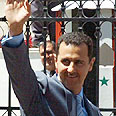"There was an interpretation error" (in the English translation) while the Syrian delegate was addressing the General Assembly's disarmament committee in Arabic Tuesday, Farhan Haq, a UN spokesman, told reporters.
"Although the interpreter suggested that the Syrian delegate had referred to an attack on a nuclear facility, what he said was 'like what happened on the 6 of September against my country'," Haq said after UN officials reviewed the Arabic tape of the remarks. "There was no use of the word nuclear".
Israeli media, referring to a transcript of the committee session on a UN website, earlier reported that the Syrian delegate had mentioned an air strike on a Syrian nuclear facility.
"Moreover, Israel was the fourth largest exporter of weapons of mass destruction and a violator of other nations' airspace and it had taken action against nuclear facilities, including the 6 July attack against Syria," the transcript said.
The Israeli air raid in northeast Syria was, in fact, on September 6, not July 6.
The Israeli reports prompted an official denial from Damascus Wednesday, with Syrian authorities insisting there was no such nuclear facility on their soil.
"The ministry denies media reports that Syria's ambassador in New York had said the September 6 raid targeted a nuclear plant because no such facility exists in Syria," the Syrian foreign ministry said in a statement.
According to a New York Times report on Sunday, Israeli warplanes bombed a site that Israeli and US intelligence believe was a partly built nuclear reactor possibly modeled after one in North Korea.
Citing unnamed US and foreign officials with access to intelligence reports, the report said it appeared Israel carried out the raid to demonstrate its determination to snuff out even a nascent nuclear project.
The facility that the Israelis struck in Syria appears to have been much further from completion than the Osirak nuclear reactor that Israel destroyed in Iraq in 1981, the paper said.
















